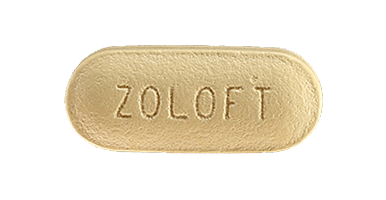When you have OCD, intrusive thoughts can be a real and constant problem. These thoughts can be disturbing, upsetting, and downright scary. If you’re looking for a way to treat these thoughts, Zoloft may be the answer for you. In this blog post, we will discuss how Zoloft can help treat OCD intrusive thoughts. We’ll also talk about the benefits of taking this medication and how it can help improve your quality of life.
Contents
Defining Zoloft
Zoloft, the brand name for sertraline, is a medication that belongs to a class of drugs called selective serotonin reuptake inhibitors (SSRIs). SSRIs work by increasing the levels of serotonin in the brain. Serotonin is a neurotransmitter that plays a role in mood and anxiety. By increasing the levels of serotonin, Zoloft can help improve mood and relieve anxiety. Zoloft is approved by the FDA to treat OCD in children, adolescents, and adults.
Zoloft is made of sertraline hydrochloride. This is the same active ingredient that is in other medications which are used to treat depression, such as Prozac and Paxil. The difference with Zoloft is that it has a higher affinity for the serotonin transporter, which is why it’s more effective in treating OCD.
Zoloft For OCD Intrusive Thoughts

Before understanding the benefits of Zoloft for OCD intrusive thoughts, it is important to understand what intrusive thoughts are. Intrusive thoughts are unwanted, persistent, and repetitive thoughts that cause anxiety or distress. These thoughts can be about anything, but they often center around themes of harm or contamination. People with OCD often try to suppress or neutralize these thoughts with other thoughts or behaviors. This can lead to a vicious cycle of OCD thoughts and behaviors.
Zoloft can help break this cycle by reducing the intensity and frequency of intrusive thoughts. In one study, Zoloft was shown to be more effective than a placebo in treating OCD intrusive thoughts. The study found that people who took Zoloft had a significant reduction in the number of intrusive thoughts, as well as the severity of their OCD symptoms.
Zoloft can also help reduce the anxiety and distress that are associated with intrusive thoughts. In one study, people who took Zoloft reported a decrease in anxiety and an increase in quality of life.
Moreover, the physiological and behavioral response to intrusive thoughts was also reduced in people who took Zoloft. This means that Zoloft can help reduce the fight-or-flight response, which is often triggered by OCD intrusive thoughts. This mechanism of Zoloft for OCD intrusive thoughts works by reducing the activity of the amygdala, which is responsible for the fear response.
Zoloft can also help reduce compulsive behaviors that are often associated with OCD. In one study, people who took Zoloft showed a significant reduction in compulsive behaviors, such as washing and checking. This happens because of the way Zoloft works on serotonin receptors. By increasing the levels of serotonin, Zoloft can help reduce the need for compulsive behaviors.
Intake And Dosage Information
Zoloft as a prescription medication is available as a tablet, an oral solution, or a extended-release capsule. The usual starting dose of Zoloft for adults with OCD is 50 mg per day. The dose can be increased to 100 mg per day if needed. The maximum recommended dose is 200 mg per day.
For children and adolescents with OCD, the starting dose of Zoloft is 25 mg per day. The dose can be increased to 50 mg per day after one week. The maximum recommended dose for children and adolescents is 200 mg per day.
Zoloft should be taken with food, either in the morning or evening. It can be taken with or without food, but taking it with food may help reduce the side effects.
The oral solution of Zoloft should be taken with a measuring spoon or cup. The extended-release capsule should be taken whole and should not be crushed, chewed, or broken.
If you miss a dose of Zoloft, take it as soon as possible. If it is almost time for your next dose, skip the missed dose and continue with your regular dosing schedule. Do not take two doses of Zoloft at the same time.
Side Effects And Precautions

The most common side effects of Zoloft include:
- nausea
- vomiting
- upset stomach
- constipation
- dry mouth
- increased sweating
- fatigue
- trouble sleeping
These side effects are usually mild and go away on their own. If they persist or become bothersome, please consult your doctor. Serious side effects of Zoloft include:
- agitation
- anxiety
- panic attacks
- tremor
If you experience any of these side effects, please consult your doctor immediately. Zoloft can also cause explicit side effects, such as:
- changes in weight or appetite
- decreased libido
- erectile dysfunction
- orgasm difficulties
Consult your doctor if you experience any of these side effects. They may be able to prescribe a different medication.
Zoloft may also cause withdrawal symptoms if you stop taking it suddenly. These symptoms include:
- irritability
- insomnia
- headache
- dizziness
If you experience any of these symptoms, please consult your doctor before discontinuing Zoloft. They may want to slowly taper off your dose to further avoid withdrawal symptoms.
Zoloft may also interact with other medications such as:
- monoamine oxidase inhibitors (MAOIs)
- tricyclic antidepressants
- selective serotonin reuptake inhibitors (SSRIs)
This can be because of the way Zoloft affects serotonin levels. If you are taking any of these medications, please consult your doctor before starting Zoloft. They may need to adjust your dose or monitor you more closely for side effects.
Things To Consider
Lastly, there are a few things and tips to consider when taking Zoloft for OCD intrusive thoughts:
- Zoloft may cause side effects and also interact with other medicines as mentioned above, so it’s important to consult your doctor before starting the medication.
- If you are pregnant, planning to become pregnant, or breastfeeding, please consult your doctor before taking Zoloft as it may not be suitable for you.
- If you have any of the following, you may want to avoid taking Zoloft or be monitored more carefully by your doctor:
a history of suicidal thoughts or behaviors
seizures
bleeding disorders
a history of drug abuse or alcohol dependence
This is because Zoloft may increase the risk of suicidal thoughts or behaviors and also because it can cause seizures.
- Moreover, Zoloft can cause bleeding and may make alcohol dependence worse.Do not drink alcohol while taking Zoloft as it can increase the risk of side effects such as drowsiness and dizziness.
- Lastly, it is essential to keep up with therapy, self-care, and healthy coping mechanisms even while taking Zoloft to ensure the best possible outcome
.Zoloft can be a helpful medication for treating OCD intrusive thoughts, but it’s important to be aware of the potential side effects and risks before starting. Consult with your doctor to see if Zoloft is right for you and always make sure to follow their directions for taking the medication. With proper care, Zoloft can be an effective treatment for OCD intrusive thoughts.
Alternative Medications
If Zoloft is something you’re considering for treating OCD intrusive thoughts, it’s also important to know that there are other options available. Some other medications that have been shown to be effective in treating OCD include:

- Fluvoxamine (Luvox)
- Paroxetine (Paxil)
- Clomipramine (Anafranil)
- Fluoxetine (Prozac)
These are all SSRIs and work by increasing serotonin levels, similar to Zoloft. There are also other classes of medications that can be effective in treating OCD, such as:
- Tricyclic antidepressants (TCAs): Amitriptyline, imipramine
- Serotonin and norepinephrine reuptake inhibitors (SNRIs): Desvenlafaxine, duloxetine
- Monoamine oxidase inhibitors (MAOIs): Phenelzine, tranylcypromine
If you and your doctor are considering alternatives to Zoloft, be sure to discuss the potential risks and side effects of these other medications as well. However, these come with their own risks and side effects so it’s important to consult your doctor before starting any new medication.
As with Zoloft, these other medications also require therapy and self-care to be most effective. Medication alone is not usually enough to treat OCD. But with a comprehensive treatment plan that includes medication, therapy, and self-care, you can effectively manage your OCD intrusive thoughts.
Conclusion
Zoloft is a prescription medication used to treat OCD intrusive thoughts. It’s important to consult your doctor before starting the medication, as Zoloft may cause side effects and interact with other medicines. The medication has equal amounts of benefits and risks, so it’s important to be informed before making a decision. With proper care, Zoloft can further be an effective treatment for OCD intrusive thoughts.
If you are struggling with OCD, know that you are not alone. There are many resources available to help you cope with this condition. Reach out to Therapy Mantra for help getting started on the road to recovery. We have a team of mental health professionals who specialize in treating OCD. Our specialists can help you develop a treatment plan that meets your specific needs. Contact us today to book an online therapy or download our free OCD treatment app on Android or iOS for more information.


